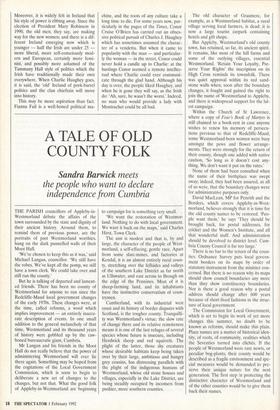A TALE OF OLD COUNTY FOLK
Sandra Barwick meets
the people who want to declare independence from Cumbria
THE PARISH councillors of Appleby-in- Westmorland debate the affairs of the town surrounded by the state and dignity of their ancient history. Around them, to remind them of previous power, are the portraits of past Westmorland worthies, hung on the dark pannelled walls of their Moot Hall.
'We've chosen to keep this as it was,' said Michael Langan, councillor. 'We still have the robes. We've kept all the pomp, we still have a town clerk. We could take over and still run the county.'
But he is talking of departed and lament- ed friends. There has been no county of Westmorland for anyone to run since the Redcliffe-Maud local government changes of the early 1970s. These changes were, at the time, called reforms, a word which implies improvement — an entirely inaccu- rate description of events. In one small addition to the general melancholy of that time, Westmorland and its thousand years of history were gobbled up by the raw- boned bureaucratic giant, Cumbria.
Mr Langan and his friends in the Moot Hall do not really believe that the power of administering Westmorland will ever lie there again. Something may be hoped from the cogitations of the Local Government Commission, which is soon to begin to deliberate a new set of changes to the changes, but not that. What the good folk of Appleby-in-Westmorland are beginning to campaign for is something very small.
'We want the restoration of Westmor- land. Nothing to do with local government. We want it back on the maps,' said Charles Hirst, Town Clerk.
The aim is modest and that is, by and large, the character of the people of West- morland, a self-effacing, gentle race. Apart from some slate-mines, and factories at Kendal, it is an almost entirely rural coun- ty, stretching over the fellsides and valleys of the southern Lake District as far north as Ullswater, and east across to Brough on the edge of the Pennines. Most of it is sheep-farming land, and its inhabitants have the instinctive conservatism of coun- trymen.
Cumberland, with its industrial west coast and its history of border disputes with Scotland, is the tougher county. Tranquilli- ty was Westmorland's virtue: the slow rate of change there and its relative remoteness means it is one of the last refuges of several species whose future is insecure, including Herdwick sheep and red squirrels. The plight of the latter, those shy creatures whose desirable habitats keep being taken over by their large, ambitious and hungry grey cousins, has distressing parallels with the plight of the indigenous humans of Westmorland, whose old stone houses and villages, especially in the Lake District, are being steadily occupied by incomers from pushier, more southern counties. The old character of Grasmere, for example, as a Westmorland habitat, a rural village serving local farmers, is dead: ,it is now a large tourist carpark containing hotels and gift shops.
But Appleby, Westmorland's old county town, has retained, so far, its ancient spirit. It remains, like most of the hill farms and some of the outlying villages, essential Westmorland. 'Retain Your Loyalty, Pre- serve Your Rights' the inscription on its High Cross reminds its townsfolk. There was quiet approval within its red sand- stone walls when, soon after the boundary changes, it fought and gained the right to join the name of Westmorland to Appleby, and there is widespread support for the lat- est campaign.
Within the Church of St Lawrence, where a copy of Foxe's Book of Martyrs is
still chained to a book-rest in case anyone wishes to renew his memory of persecu- tions previous to that of Redcliffe-Maud, some Westmorland-born women were busy amongst the pews and flower arrange- ments. They were strongly for the return of their county, though one added with native caution, `So long as it doesn't cost any- thing. We don't want it put on the rates.'
None of them had been consulted when the name of their birthplace was swept away; indeed, they had been assured, as all of us were, that the boundary changes were for administrative purposes only.
David MacLean, MP for Penrith and the Borders, which covers Appleby-in-West- morland, believes strongly that it is time for the old county names to be restored. 'Peo- ple want them,' he says 'They should be brought back, for postal addresses, for cricket and the Women's Institute, and all that wonderful stuff. And administration should be devolved to district level. Cum- bria County Council is far too large.'
There is no bar to the return of the coun- ties. Ordnance Survey puts local govern- ment borders on its maps by order of statutory instrument from the minister con- cerned. But there is no reason why its maps should show council boundaries any more than they show constituency boundaries. Nor is there a good reason why a postal address should change after 600 years because of short-lived fashions in the struc- ture of local government.
The Commission for Local Government, which is set to begin its work of yet more changes this summer, no doubt to be known as reforms, should make this plain. Place names are a matter of historical iden- tity, of roots, of community, realities which the Seventies turned into clichés. If the people of Westmorland were rare newts, or peculiar bog-plants, their county would be described as a fragile environment and spe- cial measures would be demanded to pre- serve their unique nature for the next generation. The first step in protecting the distinctive character of Westmorland and of the other counties would be to give them back their names.


















































 Previous page
Previous page